Related Topics
Achievement Awards: Franklin Institute
Right Angle Club 2017
Dick Palmer and Bill Dorsey died this year. We will miss them.
Franklin Institute Awards Week
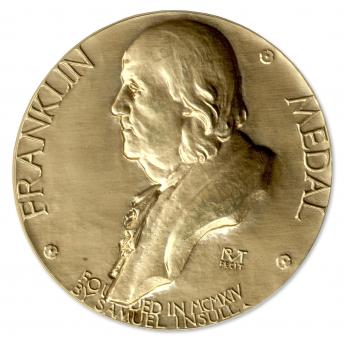
|
| Franklin Medal |
The Franklin Institute began giving medals for scientific achievement in 1824. Since Franklin died April 17, 1790, it just goes to show it takes a while to recognize genius in your own midst, even when the genius would soon come to be known as the "most remarkable man who ever lived." Indeed, he would come to be known as the founder of the American diplomatic corps, and even suspected as the man who changed his mind about King George III, thus quite plausibly becoming the person who started the Revolutionary War, who devised the essence of the Constitution which has lasted longer than any other Constitution, revised the Postal Service as Postmaster, started one of the Ivy League Universities, wrote the best-selling autobiography, invented the Franklin stove, and became President of Pennsylvania. Starting nearly penniless, he eventually became one of the richest men in the country. Looked at from a distance, it also might be possible he was the greatest Rain-maker in our history, even though he spent 28 years in England and France.
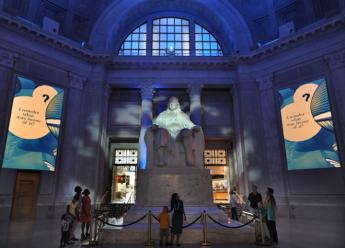
|
| Franklin Institute |
But what he was without doubt or quibble, was a scientist. He essentially invented electricity, explained its nature, and started it on its way as central to the Industrial Revolution, by inventing the lightning rod. One of the commonest quotes about him is, if there had been such a thing as a Nobel Prize, he would have won it. But you seldom hear that particular quote around the Franklin Institute. Because the idea of awarding a prize for scientific achievement was not invented by Alfred Nobel at all, but rather by the Franklin Institute in 1824, almost a century earlier. It all started with the Bower Award and continued for nine other prizes, generally referred to as Franklin Medals in nine separate scientific fields. Unlike the Nobel prize, its scope does not extend beyond science, and even in the case of the Bower Award, it honors a business leader who exploited a scientific advance and made a business out of it.
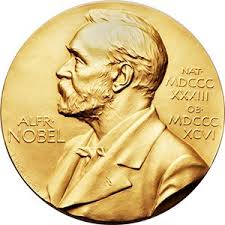
|
| Nobel Prize |
The Nobel prize became the center of Scandinavian social life by utilizing the Kings of Norway and Sweden, justifying white tie and tails, and by giving a large financial reward, which has been greatly augmented by an investment advisor in Wilmington, Delaware. This year, the Franklin Institute decided to imitate that particular feature, awarding $10,000 apiece to the awardees, and hoping that generous American donors would get the point, that a little cash will quickly equalize a century's lead in astutely recognizing scientific talent. Most of the Nobel Prize winners had previously won Franklin Medals, so this year the trustees recognized the value of something tangible, to make a real race of it.
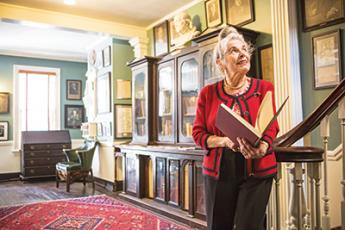
|
| Janice T. Gordon |
The Franklin Institute only holds eight hundred people, an audience limit which is exceeded before a single invitation is put in the mail, and the attendance price has risen, accordingly. That was almost solely due to the work and influence of Janice T. Gordon, who rose to be chairman of the event but kept her attention focused on competitiveness with the Nobel, and award ceremonies in general. Consequently, the audience size level is limited by the seating capacity, a phenomenon first noticed with the Philadelphia Eagles Professional Football team. The football season tickets absorb the whole capacity of the site, so local people tend to get excluded. No one gets to see a football game except out-of-towners with season tickets. It will be interesting to see what Philadelphia does with this problem, but you can be sure something will be done. The Philadelphia Assembly solved this problem by sending tickets only to descendants of former attendees at the original Assembly Ball in the Eighteenth Century, but that limits the attendance to Philadelphians--a problem in the opposite direction. Keep tuned. In other articles, we plan to describe presentations so this audience will come to understand why this event is so popular. But the goal was set by the Kentucky Derby; the first horse to win the two-minute spring races sets the pace for others to match. Even if the Kentucky Derby horse breaks his ankle, his name is the one you remember.
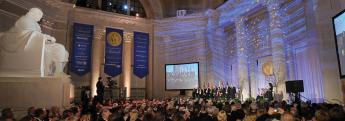
|
| Franklin Awards |
The Franklin award winners have become more national and international with time. So, increasingly the awardee's travel has gradually increased, to the point where a dinner for the award seems inadequate for such a trip to get it. So, the award ceremony now stretches to almost a week. On the first night, the awardee meets with his sponsors and fellow awardees. All day the second and third days is spent visiting high school students, for the purpose of increasing their appetite for science as a career. Selected for their promise, these students actually get time to visit with scientists at the peak of their careers, ask questions, and decide whether science is the career for them; from all reports, this is a very successful experience. On the evening of the second day, a fancy dinner is provided at a neighboring hotel, and frivolity is expected. On the third night, a television announcer is recruited as master of ceremonies, the ladies wear their jewelry, and the gentlemen are in formal attire. The awardees and their sponsors are announced, one by one, get medals placed around their necks, and watch a professionally televised summary of their work, followed by a dinner for eight hundred dressed-up Philadelphians. And on the fourth day, an all-day symposium is held by colleagues selected by the awardee for an in-depth, state of the art, presentation of the awardee's significant area of work. There are nine such concurrent seminars, followed by a lunch. Whew! By the time it's over, the guests really know something in depth, explained by the most eminent scientist in the field. And, judging by the number of awardees who return to attend subsequent award ceremonies, they really have a good time.
Originally published: Saturday, May 06, 2017; most-recently modified: Monday, May 20, 2019